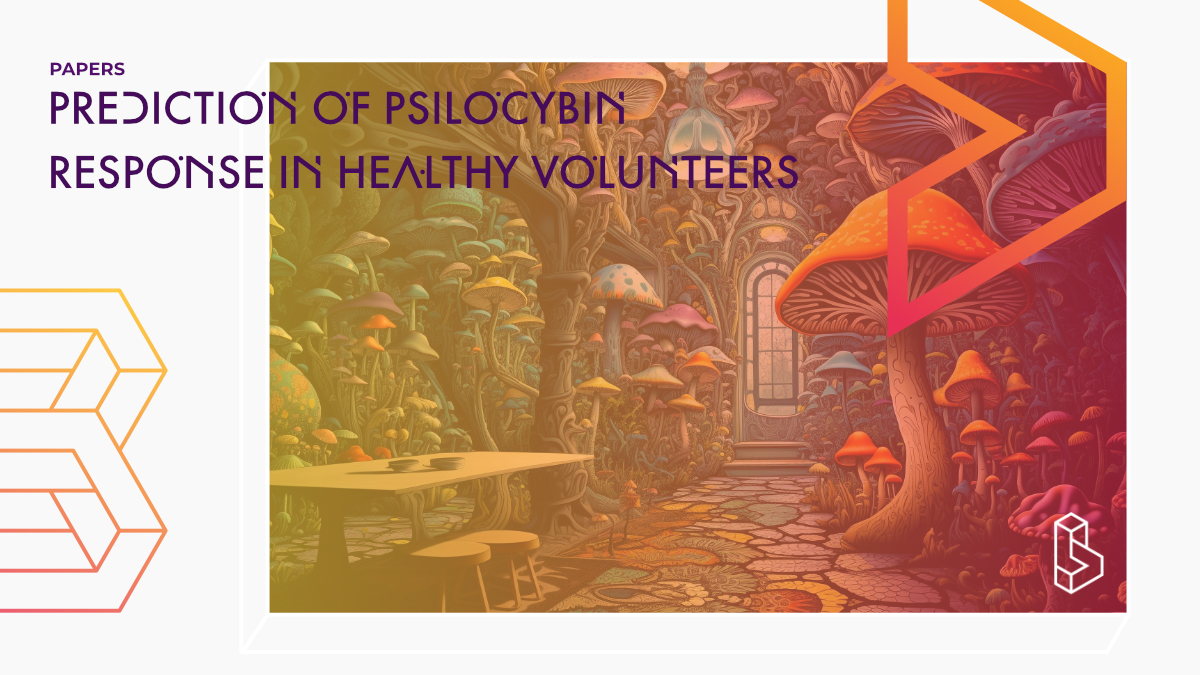This pooled-data study (n=409) looks at the non-pharmacological influences on the psychedelic experience. This includes the current mood state, drug pre-experiences, expectancies, and social and environmental variables. The drug dosage, personality trait absorption, and being emotionally excitable were the top predictors of pleasant and peak/mystical experiences.
Abstract of Prediction of psilocybin response in healthy volunteers
“Responses to hallucinogenic drugs, such as psilocybin, are believed to be critically dependent on the user’s personality, current mood state, drug pre-experiences, expectancies, and social and environmental variables. However, little is known about the order of importance of these variables and their effect sizes in comparison to drug dose. Hence, this study investigated the effects of 24 predictor variables, including age, sex, education, personality traits, drug pre-experience, mental state before drug intake, experimental setting, and drug dose on the acute response to psilocybin. The analysis was based on the pooled data of 23 controlled experimental studies involving 409 psilocybin administrations to 261 healthy volunteers. Multiple linear mixed effects models were fitted for each of 15 response variables. Although drug dose was clearly the most important predictor for all measured response variables, several non-pharmacological variables significantly contributed to the effects of psilocybin. Specifically, having a high score in the personality trait of Absorption, being in an emotionally excitable and active state immediately before drug intake, and having experienced few psychological problems in past weeks were most strongly associated with pleasant and mystical-type experiences, whereas high Emotional Excitability, low age, and an experimental setting involving positron emission tomography most strongly predicted unpleasant and/or anxious reactions to psilocybin. The results confirm that non-pharmacological variables play an important role in the effects of psilocybin.”
Authors: Erich Studerus, Alex Gamma, Michael Kometer & Franz X. Vollenweider
Notes on Prediction of psilocybin response in healthy volunteers
The data quality in the analysis was very high: “All pooled studies used placebo-controlled within-subject designs. Depending on the study, subjects received placebo and 1–4 different doses of psilocybin in 2–5 experimental sessions, each separated by at least two weeks to avoid carry-over effects. In six of the pooled studies, subjects also received a receptor blocker (i.e., buspirone, ketanserin, haloperidol, lamotrigine, and risperidone) alone and in combination with psilocybin. In the majority of the studies (n = 16), the order of drug administration was randomized and double-blind, but some of the earlier studies as well as most pilot studies (n = 7) were open-label trials.”
Summary of Prediction of psilocybin response in healthy volunteers
Responses to hallucinogens vary greatly between and within subjects, and are therefore often determined by non-pharmacological variables. These variables include the preparation of the subject, his personality structure, and current mood state, as well as the physical, social, and cultural environment in which the drug is taken.
Most studies that have looked at non-pharmacological predictors of hallucinogen response have found that personality structure, mood state, peer-support, estimated emotional support, expectations of the subjects, age, body morphology, and drug pre-experiences are important.
Find this paper
Prediction of psilocybin response in healthy volunteers
https://doi.org/10.1177/0269881116677852
Open Access | Google Scholar | Backup | 🕊
Cite this paper (APA)
Studerus, E., Gamma, A., Kometer, M., & Vollenweider, F. X. (2012). Prediction of psilocybin response in healthy volunteers. PloS one, 7(2), e30800.
Study details
Compounds studied
Psilocybin
Topics studied
Healthy Subjects
Safety
Study characteristics
Meta-Analysis
Participants
261
Humans
Compound Details
The psychedelics given at which dose and how many times
Psilocybin 8 - 22mg | 1x
Linked Research Papers
Notable research papers that build on or are influenced by this paper
Body mass index (BMI) does not predict responses to psilocybinThis pooled analysis (n=77) of body mass index (BMI) data from three psilocybin (25mg) trials finds that BMI doesn't predict the intensity of the response to psilocybin. A fixed-dosing schedule (instead of dosage based on weight which is common for MDMA and ketamine) is probably best going forward in psilocybin-assisted trials.

